0
0
0
U.S.A. Electrify Forward Act
3/8/2023, 7:58 PM
Summary of Bill HR 1879
The U.S.A. Electrify Forward Act, also known as Bill 117 hr 1879, is a piece of legislation introduced in the United States Congress. The main goal of this bill is to promote the widespread adoption of electric vehicles (EVs) and the development of a nationwide EV charging infrastructure.
The bill proposes several key initiatives to achieve this goal. Firstly, it calls for the establishment of a grant program to support the installation of EV charging stations in public places, such as parking lots, rest areas, and shopping centers. These grants would be available to state and local governments, as well as private businesses, to help offset the costs of installing charging infrastructure.
Additionally, the bill aims to expand access to EV charging by requiring federal agencies to install charging stations at their facilities and by providing funding for the deployment of charging stations along highways and in rural areas. This would help address the current lack of charging infrastructure in many parts of the country, making it easier for EV owners to travel long distances without worrying about running out of power. Furthermore, the U.S.A. Electrify Forward Act includes provisions to incentivize the purchase of EVs, such as tax credits and rebates for consumers and businesses that buy electric vehicles. These incentives are designed to make EVs more affordable and encourage more people to make the switch from traditional gasoline-powered vehicles. Overall, the U.S.A. Electrify Forward Act is a comprehensive piece of legislation that seeks to accelerate the transition to electric vehicles and reduce greenhouse gas emissions from the transportation sector. By investing in EV infrastructure and providing incentives for consumers to go electric, this bill aims to create a cleaner, more sustainable transportation system for the future.
The bill proposes several key initiatives to achieve this goal. Firstly, it calls for the establishment of a grant program to support the installation of EV charging stations in public places, such as parking lots, rest areas, and shopping centers. These grants would be available to state and local governments, as well as private businesses, to help offset the costs of installing charging infrastructure.
Additionally, the bill aims to expand access to EV charging by requiring federal agencies to install charging stations at their facilities and by providing funding for the deployment of charging stations along highways and in rural areas. This would help address the current lack of charging infrastructure in many parts of the country, making it easier for EV owners to travel long distances without worrying about running out of power. Furthermore, the U.S.A. Electrify Forward Act includes provisions to incentivize the purchase of EVs, such as tax credits and rebates for consumers and businesses that buy electric vehicles. These incentives are designed to make EVs more affordable and encourage more people to make the switch from traditional gasoline-powered vehicles. Overall, the U.S.A. Electrify Forward Act is a comprehensive piece of legislation that seeks to accelerate the transition to electric vehicles and reduce greenhouse gas emissions from the transportation sector. By investing in EV infrastructure and providing incentives for consumers to go electric, this bill aims to create a cleaner, more sustainable transportation system for the future.
Congressional Summary of HR 1879
U.S.A. Electrify Forward Act
This bill provides incentives (e.g., grants and loans) for the development, production, manufacturing, and distribution of electric vehicles and charging infrastructure for such vehicles.
Read the Full Bill
Current Status of Bill HR 1879
Bill HR 1879 is currently in the status of Bill Introduced since March 12, 2021. Bill HR 1879 was introduced during Congress 117 and was introduced to the House on March 12, 2021. Bill HR 1879's most recent activity was Referred to the Subcommittee on Energy. as of March 16, 2021
Bipartisan Support of Bill HR 1879
Total Number of Sponsors
1Democrat Sponsors
1Republican Sponsors
0Unaffiliated Sponsors
0Total Number of Cosponsors
4Democrat Cosponsors
4Republican Cosponsors
0Unaffiliated Cosponsors
0Policy Area and Potential Impact of Bill HR 1879
Primary Policy Focus
EnergyAlternate Title(s) of Bill HR 1879
U.S.A. Electrify Forward Act
To promote American leadership in vehicle manufacturing, job creation, improved air quality, and climate protection through domestic manufacturing of low- and zero-emission vehicles and development of electric vehicle charging networks, and for other purposes.
U.S.A. Electrify Forward Act
Comments
Sponsors and Cosponsors of HR 1879
Latest Bills
National Defense Authorization Act for Fiscal Year 2026
Bill S 1071December 13, 2025
Enduring Justice for Victims of Trafficking Act
Bill S 2584December 13, 2025
Technical Corrections to the Northwestern New Mexico Rural Water Projects Act, Taos Pueblo Indian Water Rights Settlement Act, and Aamodt Litigation Settlement Act
Bill S 640December 13, 2025
Incentivizing New Ventures and Economic Strength Through Capital Formation Act of 2025
Bill HR 3383December 13, 2025
BOWOW Act of 2025
Bill HR 4638December 13, 2025
Northern Mariana Islands Small Business Access Act
Bill HR 3496December 13, 2025
Wildfire Risk Evaluation Act
Bill HR 3924December 13, 2025
Energy Choice Act
Bill HR 3699December 13, 2025
ESTUARIES Act
Bill HR 3962December 13, 2025
Improving Interagency Coordination for Pipeline Reviews Act
Bill HR 3668December 13, 2025
Infrastructure Investment and Jobs Act
Bill HR 3684May 11, 2023
LIFT America Act
Bill HR 1848March 8, 2023
CLEAN Future Act
Bill HR 1512March 8, 2023


